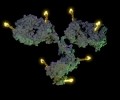Eden Biodesign becomes cGMP provider for PER.C6 technology
Under the terms of the agreement, Eden will offer contract manufacturing services to Crucell's PER.C6 licensees in the field of vaccines and gene therapy. The agreement sees Crucell further strengthen its presence in a contract bio-manufacturing market, which was worth about $2.5bn in 2006; expected to expand by around 5 per cent a year through to 2011.
Eden join an illustrious group of companies that form Crucell’s vendor network, in which licensees like Merck & Co, Morphosys and Eli Lilly, use PER.C6 for protein development and manufacture. Eden form part of the network, along with firms such as Bioceros that provide manufacturing and support capacity in line with increased demand for the cell line.
“We have demonstrated that the combination of Crucell's technology and Eden Biodesign's expertise delivers value by accelerating progression of products into and through clinical development, while maintaining the ability to scale-up production and achieve a highly attractive cost-of-goods," said Crawford Brown, CEO of Eden Biodesign.
Eden Biodesign, the biopharmaceuticals business of Watson Pharmaceuticals, currently develops and produces vaccines and gene therapy products derived from diverse virus types.
The company also provides custom-designed and licensed cGMP manufacturing facilities that offer viral production using production technologies and processes, including a platform approach for the production of adenoviruses in stirred tank suspension culture.
Yield boosting technology
The PER.C6 platform, which comprises Crucell’s human cell line with DSM’s proprietary XD yield boosting technology, uses cell culture for the large-scale production of recombinant proteins and monoclonal antibodies, including influenza vaccine, where the virus is grown on specially selected cell lines instead of chicken eggs.
The strengths of the PER.C6 technology lie in its safety profile, scalability and productivity under serum-free culture conditions. This cell culture process has the potential to reduce the start-up time for manufacturing by half and could result in a more predictable manufacturing process.
While protein and antibody production are likely to remain the most common industrial applications for PER.C6, the technology also has applications in the production of vaccines and the development of gene therapies.
The popularity of Crucell’s proprietary PER.C6 cell-line technology means the Dutch company is not short of firms eager to align themselves with an established and proven technology used by the likes of Johnson & Johnson, DSM Biologics, Sanofi-Aventis, Novartis, Wyeth, GSK, CSL and Merck & Co.
A recent Business Insights report estimated that the developmental pipelines of pharmaceutical firms' contain around 500 candidate protein drugs and a further 50 protein-based medications that have entered clinical trials.
In addition, the current global market for proteins and monoclonal antibodies is worth between $50bn and $60bn and is estimated to grow to $200bn by 2020, according to a Reuters report.







